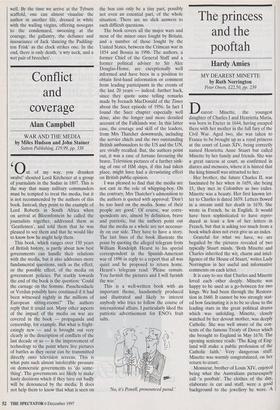Conflict and coverage
Alan Campbell
WAR AND THE MEDIA by Miles Hudson and John Stainer Sutton Publishing, £19.99, pp. 338 Out of my way, you drunken swabs!' shouted Lord Kitchener at a group of journalists in the Sudan in 1897. This is the way that many military commanders must be tempted to treat the media, but it is not recommended by the authors of this book. Instead, they point to the example of Lord Roberts in South Africa when on arrival at Bloemfontein he called the journalists together, addressed them as `Gentlemen', and told them that he was pleased to see them and that he would like to know how he might help them.
This book, which ranges over 150 years of British history, is partly about how best governments can handle their relations with the media, but it also addresses more fundamental questions, such as the effect, or the possible effect, of the media on government policies. Put starkly towards the end of the book is the question: 'Could the carnage on the Somme, Passchendaele or Verdun possibly have continued if it had been witnessed nightly in the millions of European sitting-rooms?' The authors reply that it could not. Many other aspects of the impact of the media on war are covered in the book — propaganda and censorship, for example. But what is fright- eningly new — and is brought out very clearly in the description of conflicts of the last decade or so — is the improvement of technology to the point where live pictures of battles as they occur can be transmitted directly onto television screens. This is what puts such almost intolerable pressure on democratic governments to 'do some- thing'. The governments are likely to make hasty decisions which if they turn out badly will be denounced by the media. It does not help them to know that what is seen on the box can only be a tiny part, possibly not even an essential part, of the whole situation. There are no slick answers to such difficult questions.
The book covers all the major wars and most of the minor ones fought by Britain, and a number of those fought by the United States, between the Crimean war in 1854 and Bosnia in 1996. The authors, a former Chief of the General Staff and a former political adviser to Sir Alec Douglas-Home, are exceptionally well informed and have been in a position to obtain first-hand information or comment from leading participants in the events of the last 20 years — indeed, further back, since they quote some telling remarks made by Ivenach MacDonald of the Times about the Suez episode of 1956. In fact I found the Suez chapter especially well done, also the longer and more detailed account of the Falklands war. In this latter case, the courage and skill of the leaders, from Mrs Thatcher downwards, including the service chiefs and the two outstanding British ambassadors to the US and the UN, are vividly recalled. But, the authors point out, it was a case of fortune favouring the brave. Television pictures of a further sink- ing of one of HM ships, if this had taken place, might have had a devastating effect on British public opinion.
I was pleased to find that the media are not cast in the role of whipping-boy. On the contrary, Mrs Thatcher's admonition to the authors is quoted with approval: 'Don't be too hard on the media. Some of their people are good.' Of course, war corre- spondents are, almost by definition, brave and patriotic, but the authors point out that the media as a whole are not necessar- ily on our side. They have to have a story. The last lines of the book illustrate the point by quoting the alleged telegram from William Randolph Hearst to his special correspondent in the Spanish-American war of 1896 in reply to a report that all was quiet and he proposed to return home. Hearst's telegram read: 'Please remain. You furnish the pictures and I will furnish the war.'
This is a well-written book with an important theme, handsomely produced and illustrated and likely to interest anybody who tries to follow the course of international affairs, I particularly liked the patriotic advertisement for ENO's fruit salts.
No, its Powell, pronounced pseud.'


















































































 Previous page
Previous page